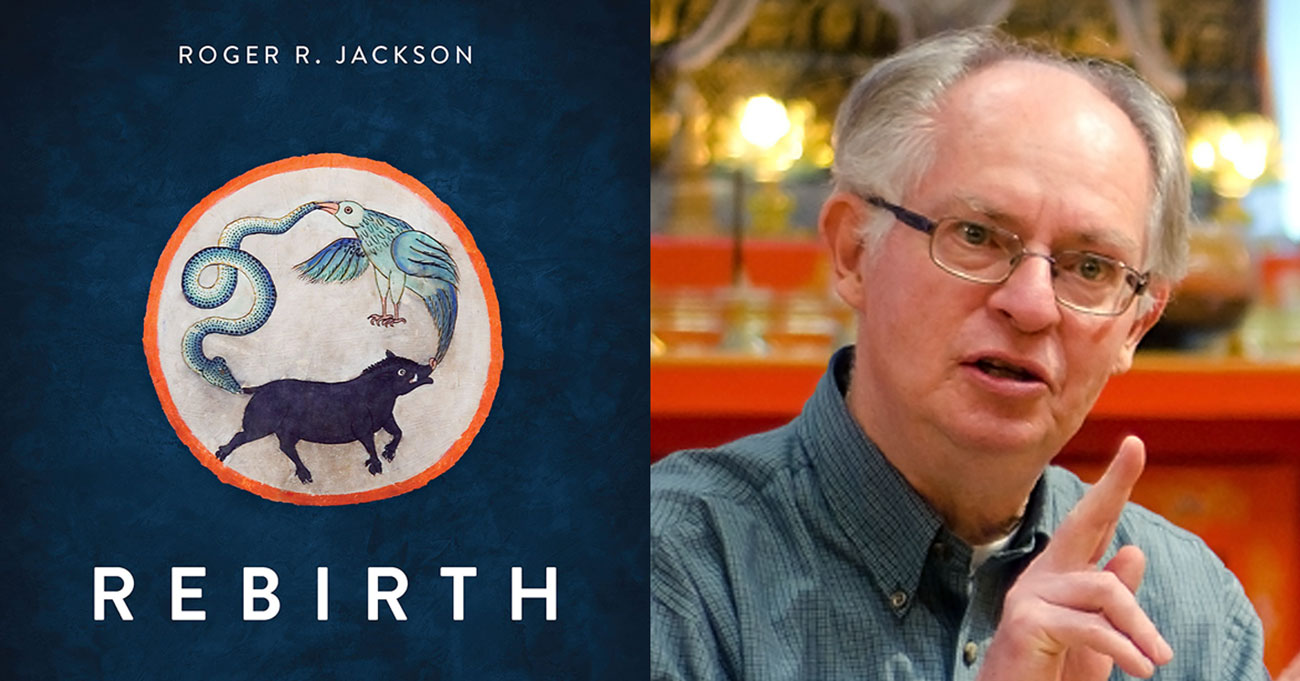Purification with the Four Powers
Using regret, reliance, remedy, and resolve to purify past karma The post Purification with the Four Powers first appeared on Tricycle: The Buddhist Review. The post Purification with the Four Powers appeared first on Tricycle: The Buddhist Review.

This body and life are changing, like a water bubble;
remember how quickly they perish and death comes.
After death, just like a shadow follows the body,
the results of negative and positive karma follow.
When I have found definite conviction in this,
please bless me always to be conscientious
in abandoning even the slightest collection of shortcomings
and in accomplishing all virtuous deeds.
–Tsongkhapa, “The Foundation of All Good Qualities”
We now have a precious human life, but it will someday end and our mind will travel to its next rebirth. Naturally we wish to be born in a favorable situation rather than an unfavorable one, and taking refuge will facilitate that. However, since it is mainly our karma, or actions, that determines the realm and circumstances of our next life, it is important to understand karma and do our best to live according to it. Otherwise, even if we attain another human rebirth, our life might be short or plagued with problems.
Like rebirth, karma is a Buddhist topic people sometimes have trouble accepting. Remember, the Buddha said we should investigate things for ourselves and not blindly believe them. When talking about karma, Lama Yeshe would say that we can see evidence of it in our daily life. We sometimes wake up in a bad mood—unhappy with ourself, our life, job, partner, and so on. What kind of experiences will we have that day with such a mental state? Mostly bad ones. On the other hand, if we start the day feeling cheerful and loving, wanting to be kind and helpful to others as much as we can, we are more likely to have positive experiences. This illustrates the basic principle of karma: Whether we are happy or suffer is mainly up to us. We are the creators of our experiences.
The Buddhist teachings on karma are complex, containing many details regarding the types of karma that are virtuous and nonvirtuous, the various results of these, and so on. Before diving into those, it’s helpful to start by looking at general characteristics of karma to understand better what it is and how it works.
1. Karma is definite
Karma is the Sanskrit term for action; it refers to actions we do with our body, speech, and mind. It is sometimes called the “law of cause and effect” because our actions are the causes of effects that we will experience in the future. However, it is a natural law, like gravity, and not one fabricated by anyone, including the Buddha—he merely discovered the workings of karma while in deep meditation.
The first general characteristic of karma—that karma is definite—means there is a definite correlation between the actions we do and the experiences we will have later: Nonvirtuous actions bring suffering, not happiness, and virtuous actions bring happiness, not suffering. This is like what we observe in nature: Cauliflower seeds bring cauliflower, not tomatoes, and tomato seeds bring tomatoes, not cauliflower.
How do we know if an action is nonvirtuous or virtuous, negative or positive? One way is according to the motivation: Negative actions are those motivated by delusions such as anger, attachment, jealousy, and ignorance, while positive actions are those motivated by beneficial attitudes such as compassion, love, nonattachment, and wisdom.
Another way to distinguish nonvirtuous and virtuous actions is by way of their results. Buddhist scriptures define nonvirtue as that which brings suffering and virtue as that which brings happiness. Most of us lack the ability to foresee the future results of our actions, so the Buddha—who had this ability—explained ten nonvirtuous actions that cause the greatest amount of suffering: killing, stealing, unwise and unkind sexual behavior, lying, divisive speech, harsh speech, idle talk, covetousness, ill-will, and wrong views. He also taught a corresponding list of ten virtuous actions that bring the greatest happiness: These involve consciously refraining from the ten nonvirtuous actions, knowing they lead to misery, and engaging in their opposites—protecting life and property, speaking honestly and kindly, and so on.
Bring to mind several negative actions you have done. Reflect that, although at the time they may not have seemed harmful, they will bring problems later if you do not purify them. If you can accept this, decide to learn and practice purification methods and try your best to avoid repeating those actions in the future. You can also commit yourself to engage in positive actions as much as possible, understanding that they are the cause of the happiness and good experiences that you wish for.
2. Karma increases
The Tibetan Dhammapada, a collection of the Buddha’s teachings, says:
Even a tiny evil deed
can cause great ruin and trouble
in the world that lies beyond—
like poison that has entered the body.
Even small meritorious acts
bring happiness to future lives,
accomplishing a great purpose
like seeds becoming bounteous crops.
Just as a single seed planted in the right environment and conditions can bring a large tree bearing flowers and fruit every year, the karmic imprints of our actions can lead to multiple results over a long period of time. Nonvirtuous actions, if left unpurified, will bring numerous painful experiences, both in our present life and in future ones. Likewise, virtuous actions, if not opposed by a negative force such as anger, will lead to many positive experiences occurring over many lifetimes. This is true for both major, significant actions and those that seem minor or insignificant.
If this makes sense to you, resolve to do your best to avoid negative actions, even relatively light ones like killing insects, and to perform as many positive actions as possible, including those that don’t require much effort, such as offering a kind smile to a stranger.
3. If we do not perform an action, we will not experience its result
The agreeable and disagreeable experiences we encounter in life are the result of our own virtuous and nonvirtuous past actions, respectively. Other conditions such as family, environment, society, and global events play a role, but the principal cause of our happy experiences is past virtuous deeds and the principal cause of our painful experiences is past nonvirtue. Understanding this helps us take responsibility for our experiences rather than blaming others for our problems or expecting them to make us happy.
This general characteristic also means that our future experiences depend on our present actions. To attain the good experiences we naturally wish for, we must create the right causes, just as farmers who want a harvest of corn must plant seeds, water them, and care for the young shoots. Standing in a field and praying for corn to magically appear doesn’t work! Likewise, to avoid the unpleasant experiences we do not want, we must refrain from their causes.
Check if you believe that your happiness and unhappiness are mainly due to external things—other people, the government, society, the environment. If so, recognize that this notion is unrealistic. Resolve to change it and learn to accept that the main responsibility for your experiences lies with you.
4. Karma is never lost
Our actions of body, speech, and mind leave imprints on our consciousness that do not disappear on their own. At some later point—usually in a future life—when the right conditions come together, these imprints will ripen as pleasant or painful experiences, like seeds developing into plants and trees. In the Tibetan Dhammapada, the Buddha said:
Whether it was good or bad,
the power of any action
once performed is never lost;
the results arise accordingly.
There are exceptions to this. Negative karma can be purified with the four opponent powers: feeling regret, taking refuge, applying remedies, and resolving to not repeat the action. The seeds of positive actions can be damaged by getting angry or generating certain wrong views—rejecting karma or the possibility of attaining enlightenment. Fortunately, we can protect the good karma we create by dedicating it to enlightenment for the benefit of all beings and recalling emptiness, at whatever level we understand it.
Karma is not fate; we are not doomed to suffer as a result of our negative actions. These can be purified with the four opponent powers—regret, reliance, remedy, and resolve. These are primarily mental states we can generate anytime, anyplace. Each of the four purifies one of the four types of results: (1) the power of regret purifies the experience similar to the cause, (2) the power of reliance purifies the environmental result, (3) the power of remedy purifies the ripened result, and (4) the power of resolve purifies the action similar to the cause.
There is no nonvirtue so negative that it cannot be purified. It’s a good idea to do purification practice daily, especially at the end of the day, to rectify the negative actions we committed during the day and go to sleep with a clear mind. We can also purify negative actions we did earlier in our life. The following meditation explains one way of doing a purification practice with the four powers.
1. The power of regret
Regret is an intelligent recognition that something we did was mistaken, a cause of suffering for others and/or ourselves. It is not guilt, an overly emotional reaction where we think we are permanently bad and hopeless. Regret is more rational and constructive; we feel remorse for the action because we see it as wrong, wish we had acted otherwise, and aspire to find constructive solutions. Generating regret purifies the karmic result that is similar to the cause in terms of experience—having experiences similar to those we inflicted on others.
Bring to mind actions you did recently or in the distant past that you recognize as unskillful or harmful. Recognize that these actions are the cause of suffering for yourself and others, both in the short-term and long-term, and generate a sincere feeling of regret that you did them. Reflect that if you do not purify these actions, the imprints they left on your mind will bring future problems and misfortune. They will also hinder your progress on the spiritual path and keep you trapped in samsara, forced to undergo continuous suffering and unable to actualize your potential for enlightenment. Recall your wish for happiness and spiritual realizations, feel that you deserve these, and resolve to purify the karma that prevents their attainment.
2. The power of reliance
For Buddhists, reliance involves renewing our refuge in the Three Jewels and our compassionate wish to benefit others and not harm them. If you do not identify as Buddhist, you can bring to mind another person or object you have faith in or the personal values you try to live by, which you transgress by performing negative actions.
Focusing on these refuge objects or personal values, humbly acknowledge your mistakes. Using your own words and speaking from your heart, make a request for forgiveness and guidance to help you avoid repeating those mistakes in the future.
To rectify your actions that harmed others, remember that everyone wishes to be happy and to not suffer, just as you do. Generate loving-kindness and compassion and a sincere wish to only benefit others and not harm them.
Remembering that the power of reliance purifies the environmental result of our negative actions—being born or living in place with unpleasant and unconducive conditions—will inspire you to practice it regularly.
3. The power of remedy
This next of the four powers means performing positive, virtuous actions to counteract the negative ones we have committed. One remedy is to recite the mantra of an enlightened being such as Shakyamuni Buddha, visualizing the Buddha while imagining light flowing from him. The light fills your entire body and mind and purifies all your negative karma and delusions.
Other recommended remedies are to recite, study, or contemplate sutras such as the Heart Sutra; make offerings to holy beings; recite the names of buddhas; and create images of buddhas or make donations to the building of monasteries, stupas, or holy objects.
It is said that you can use any virtuous, constructive action as the remedy to nonvirtues, so feel free to be creative—you could volunteer in a food bank or animal shelter, for example, or make donations to charities. Practicing the power of remedy purifies the ripened result of our nonvirtues—taking rebirth in an unfortunate realm in a future life.
4. The power of resolve
The power of resolve involves mentally promising to not do the same negative actions again, according to your ability. This power purifies the result similar to the cause in terms of action—having the instinctive tendency to repeat the same negative action again.
There may be some actions, such as physically harming others or selling illegal drugs, that you are confident you can completely stop, so pledge to do that. However, with more minor actions or those you are strongly habituated to, it would not be realistic to make such a promise—there’s a good chance you would break it and that could damage your self-confidence. Instead, you can promise to refrain from those actions for a certain period of time—if only for one hour, or even five minutes—or simply resolve to do your best to be mindful and gradually decrease doing them.
Conclusion
At the conclusion of your purification practice, feel a sense of joy and lightness, and generate the wish that all living beings could purify their negative karma so they do not have to experience its suffering results.
♦
© 2024 by Kathleen McDonald (Sangye Khadro), How to Meditate on the Stages of the Path: A Guide to the Lamrim. Reprinted by arrangement with Wisdom Publications.

 Tfoso
Tfoso 































